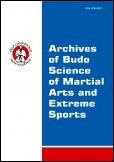2023, Volume 19, Issue 1
The effects of imagery training pre-sleep’s on dart throwing skill
Mohsen Afrouzeh1, FERMAN KONUKMAN2, RABIU MUAZU MUSA 3
11Department for Management of Science and Technology Development, Vietnam National University Ho Chi Minh City: Ho Chi Minh City, VN , Ho Chi, Vietnam
2Sport Science Program, College of Arts and Sciences, Sport Science Program, Qatar University, Doha Qatar, Mename, Qatar
3Centre for Fundamental and Liberal Education, Centre for Fundamental and Liberal Education, Universiti MalaysiaTerengganu, 21030 Kuala Nerus, Terengganu, Malaysia, Kuala Nerus, Malaysia
Author for correspondence: Mohsen Afrouzeh; 1Department for Management of Science and Technology Development, Vietnam National University Ho Chi Minh City: Ho Chi Minh City, VN , Ho Chi, Vietnam; email: M_afrozeh@yahoo.com
Full text
Abstract
Background & Study Aim: The evidence obtained from several research studies showed that night sleep increasing motor performance. However, there is a limited information about night sleep’s impact on mental imagery (MI). Therefore, the purpose of this study was knowledge about the effects of PETTLEP (based physical, environmental, task, timing, learning, emotion and perspective) imagery training pre-sleep on dart throwing motor performance skill.
Material & Methods: Subjects were thirty male ages 16 to 18 years old and randomly placed into three groups as consolidated PETTLEP MI group (n = 10), preliminary MI group (n = 10) and physical exercise only group (n = 10). A pre-test and post-test design applied and Movement Imagery Questionnaire-Revised (MIQ-R) was used to measure participants' imagery ability. The alpha level was set at p<0.05. Paired t-test was used to follow up the significant interaction.
Results: The results showed that there were significant differences between mean ratings scores of pre-test post-test in PETTLEP MI consolidated group (t12 = 4.588, p<0.05 ) and there were no significant difference between mean ratings scores of pre-test post-test in Preparatory PETTLEP MI (t12 = 0.671, p<0.05) and physical practice groups (t12 = −0.529, p<0.05). Results of the one-way analyses of variance indicated that there were significant differences between the post-test scores of three groups (F = 4.711, p<0.05).
Conclusions: Such findings highlight the reliability of MI in learning process, that is assumed consolidated when related to sleep. Further research is thus needed to confirm the present results by recording polysomnographic data. Whether the sleep related neural mechanisms involved in the consolidation process following mental practice are similar to those following physical practice should thus be confirmed.
Key words: effect of PETTLEP, Movement Imagery Questionnaire-Revised, Pittsburgh Sleep Quality Index





